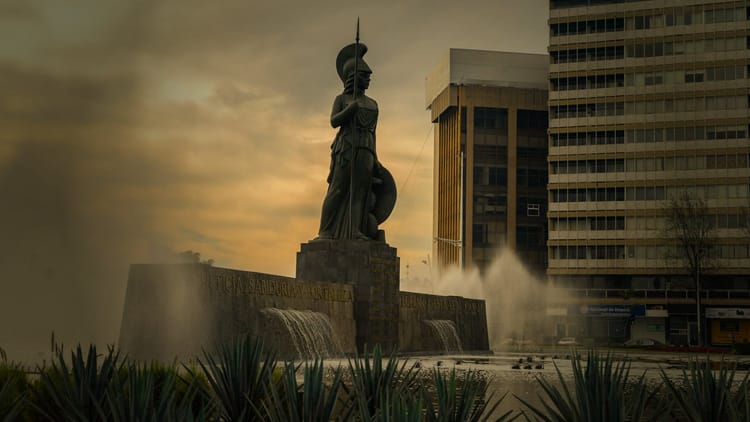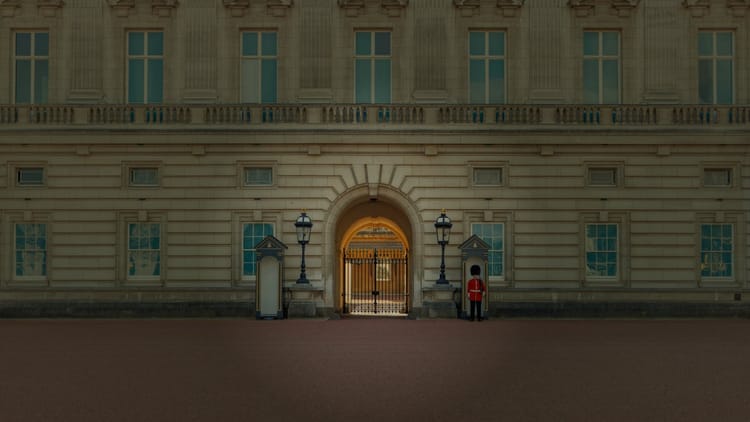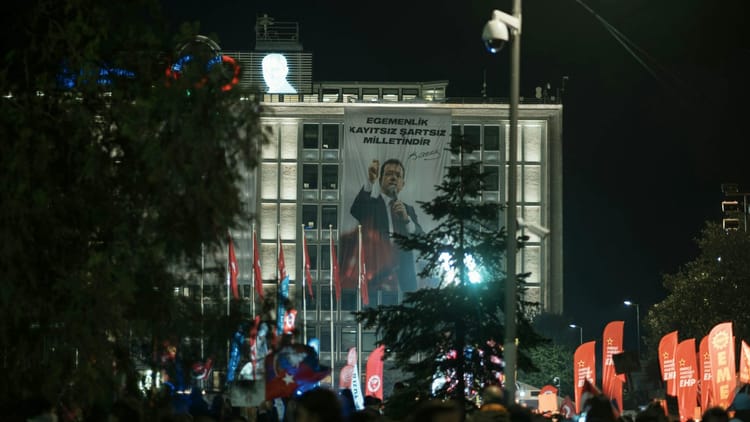‘There is no indictment’

Recently: Is the world entering a new era of catastrophic risk? Serhii Plokhy’s new book, The Nuclear Age: An Epic Race for Arms, Power, and Survival.
Today: The U.S. government’s criminal case against the FBI’s former director James Comey has collapsed over a procedural error. The statute of limitations has expired. Now what?
+ For members: Why are investors down on AI? Daron Acemoglu on excesses of enthusiasm, returns on investment, and the distinctive nature of human reasoning.
& New music from SML ...
The unsigned warrant
The U.S. Department of Justice acknowledged on Wednesday that a full grand jury never reviewed the final indictment against former Federal Bureau of Investigation Director James Comey—an admission that could sink the case.
Prosecutors told U.S. District Judge Michael Nachmanoff that grand jurors rejected an early version charging Comey with three counts. Hours later, the grand jury’s foreperson signed off on a two-count indictment. But prosecutors never presented that revised indictment to the full grand jury. Only the foreperson and one other grand juror were present when prosecutors handed it to a magistrate judge. “There is no indictment Mr. Comey is facing,” his defense lawyer, Michael Dreeben, said. The statute of limitations has expired. Assistant U.S. Attorney N. Tyler Lemons downplayed the error, arguing prosecutors had only removed the count the grand jury rejected: “The new indictment wasn’t a new indictment.” Nachmanoff didn’t issue a ruling from the bench, saying the issues were “too weighty and too complex” for an immediate decision.
The admission came during a hearing on Comey’s motion to dismiss the case as a vindictive prosecution. Dreeben argued President Donald Trump broke down Justice Department independence by directing prosecutors to charge Democratic officials regardless of evidence. Three DoJ teams had investigated Comey and declined charges. Trump then forced out the U.S. attorney who declined to prosecute and replaced him with Lindsey Halligan, a White House aide with no prosecutorial experience. Days before the statute of limitations expired, Trump posted on social media, demanding Attorney General Pam Bondi charge Comey, California’s Senator Adam Schiff, and New York Attorney General Letitia James, declaring all three “guilty as hell.”

Meanwhile
- Peace plan, then strike. Washington and Moscow have been secretly drafting a 28-point peace plan for Ukraine—without Ukraine at the table. U.S. envoy Steve Witkoff spent three days in Miami with Russian envoy Kirill Dmitriev hammering out terms Ukrainian officials call “heavily tilted toward Russia.” Hours after the plan surfaced on Wednesday, Russian missiles killed at least 25 people in Ternopil, Ukraine, about 200 kilometers from the Polish border—the deadliest strike on western Ukraine since 2022. Two apartment buildings were hit; 26 people remain trapped. Russia fired 476 drones and 48 missiles overnight as Ukraine’s President Volodymyr Zelenskyy arrived in Turkey for talks with President Recep Tayyip Erdoğan, who’s been mediating between Kyiv and Moscow.
- Lasers off Scotland. A Russian spy ship used lasers to disrupt Royal Air Force pilots tracking it near waters around the United Kingdom. It’s the first time Russia has deployed the tactic against British forces, the U.K.’s defense secretary, John Healey, said on Wednesday. It was the second time the Yantar entered U.K. waters this year. Royal Navy and RAF surveillance planes were following it north of Scotland when the incident happened. Healey called the move “deeply dangerous” and changed the rules of engagement to allow closer pursuit.
- Brazil sentences coup plotters. Brazil’s Supreme Court sentenced nine military officers to up to 24 years on Tuesday for plotting to assassinate President Luiz Inácio Lula da Silva, Vice President Geraldo Alckmin, and Supreme Court Justice Alexandre de Moraes. The plot didn’t advance on account of the Army commander’s lack of support. The sentences follow former President Jair Bolsonaro’s September sentencing to 27 years for leading the criminal organization behind the attempted coup.
- The Epstein bill awaits. Legislation requiring the U.S. Justice Department to release all investigation records related to Jeffrey Epstein reached Trump’s desk on Wednesday. The House of Representatives voted 427-1 on Tuesday; the Senate passed it hours later. Trump reversed his opposition over the weekend but hadn’t signed as of Wednesday evening. In the meantime, the former U.S. treasury secretary Larry Summers resigned from OpenAI’s board on Wednesday over his Epstein connections, while Attorney General Pam Bondi said the Justice Department would investigate Epstein’s ties to prominent Democrats and financial institutions.
- Canada’s oldest auctioned. Hudson’s Bay auctioned 27 paintings in Toronto on Wednesday, with standing-room-only crowds watching Canada’s 355-year-old company liquidate assets. The star piece—a 1935 Winston Churchill oil painting estimated at CA$400,000 to $600,000—went for $1.3 million. Most paintings depicted company and Canadian history, commissioned for calendars distributed free from 1913 to 1970. The auction is part of bankruptcy proceedings after a $329.7 million loss and collapse under $2 billion in debt.

Wary of fast fashion?
Shop Congo Clothing Company and
make a difference—in style.
From the files
AI’s math problem
Why are investors down on artificial intelligence? Daron Acemoglu on excesses of enthusiasm, returns on investment, and the distinctive nature of human reasoning.

On November 18, Microsoft and Nvidia announced a US$30 billion investment in Anthropic, which makes the AI chatbot Claude. Microsoft is still the largest shareholder in OpenAI, Anthropic’s main competitor, while Nvidia, which this year became the first company worth more than $4 trillion, supplies most of the semiconductor chips for both AI firms.
The new investment continues the massive spending spree in AI, now in its second year. Amazon, Microsoft, Meta, and Oracle have invested about $320 billion on AI—mostly chips and data centers—so far in 2025, putting them on pace to double their spending from last year.
But the stock market appears to be losing its enthusiasm for the new technology: The Nasdaq stock index, dominated by U.S. tech firms, is set to record its first monthly drop since March, when global markets shuddered ahead of President Donald Trump’s tariffs. As of November 18, the index is down more than 5 percent for the month.
Meanwhile, Oracle has lost about $60 billion in market value since announcing a $300-billion deal with Open AI. To put that drop in perspective, $60 billion is more than the value of General Motors. Oracle has lost about $315 billion from its all-time value peak, just after the announcement of the OpenAI deal—and $315 billion is roughly the annual GDP of Portugal.
Even Sundar Pichai, the CEO of Alphabet, says AI stock prices show “elements of irrationality”—and Pichai is the guy who said in 2023 that AI’s effects would be “more profound than fire.” This week, for the first time in 20 years, a regular survey of investment-fund managers shows a majority saying companies are over-investing.
Why do markets seem to be turning against AI?
It’s a question of fundamental business math, as Daron Acemoglu explores here in The Signal: As spending on AI has risen dramatically, revenues haven’t come remotely close to covering the investments, and the steep increases in capital expenditures make it less and less likely that the technology will be able to deliver sufficient returns to investors anytime soon. For example, OpenAI is on track to record only about $12.5 billion in revenue this year.
More and more companies and individuals are using AI, but, Daron says, “These AI applications just aren’t creating significant revenue”—adding, “I expect that in 2030, most U.S. businesses and jobs will look more or less like they do today. The amazing AI transformation some predict? It’s still far-fetched. And if that’s the case, then there isn’t much space for anyone to make hundreds of billions of dollars—which is what they would need in order to justify these investments.” …
Your loyal guide to a changing world.
Membership with The Signal means exclusive access to premium benefits:
- Regular profiles on the questions behind the headlines
- In-depth feature interviews with our network of specialist contributors from across America and around the world
- The despatch, our weekly current-affairs and cultural-intelligence briefing
- Early access to new products, including print extras
It also means vital support for an independent new enterprise in current-affairs journalism.
New music
‘Taking Out the Trash’
SML is a supergroup from the contemporary Los Angeles jazz scene: the bassist Anna Butterss, the synthesist Jeremiah Chiu, the saxophonist Josh Johnson, the percussionist Booker Stardrum, and the guitarist Gregory Uhlmann. This is slick modern jazz with no fear of electronics. Cooks.





